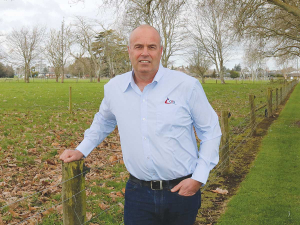DairyNZ Levy Vote Underway as Chair Highlights Seven-Fold Return
Voting has started for the renewal of DairyNZ's milksolids levy.
 CRV New Zealand managing director James Smallwood rejects suggestions that the New Zealand dairy industry has not made comparable genetic gain to other countries in recent years.
CRV New Zealand managing director James Smallwood rejects suggestions that the New Zealand dairy industry has not made comparable genetic gain to other countries in recent years.
DairyNZ's proposal for a single national animal evaluation breeding index that incorporates genomics is being opposed by a second major herd improvement company.
Dutch company CRV says while it agrees with the concept proposed by DairyNZ, it "does not endorse the proposal as it stands". It joins New Zealand farmer-owned herd improvement company LIC which has also refused to back the proposal.
CRV New Zealand managing director James Smallwood points out that CRV in the Netherlands is a founder and full partner of the EuroGenomics Cooperative.
"Through this partnership we have experience in sharing reference population data with industry partners to achieve the most reliable genomic evaluations," he told Dairy News.
"What has been proposed by DairyNZ is one option. The learnings from our EuroGenomics partnership demonstrate there are alternative ways the New Zealand dairy industry can work together to get the best outcome for our farmers."
DairyNZ - through subsidiary New Zealand Animal Evaluation Ltd (NZAEL) - believes that creating one animal evaluation index would ensure breeding decisions are made consistently.
It proposes that a single evaluation will be co-ordinated by NZAEL - as an industry-good, credible source of data available to everyone to use.
The sector is currently using three Breeding Worth animal evaluation indexes - LIC, CRV and NZAEL. DairyNZ chair Jim van der Poel says this creates confusion in the sector - and sub-optimal outcomes.
"We believe the best way to help dairy farmers achieve the highest rate of genetic gain in their herd is to have one independent Breeding Worth (BW), including genomics and involving all the industry players."
But in a letter to its farmer customers, CRV claims that recent communication from DairyNZ and NZAEL has suggested that the New Zealand dairy industry has not made comparable genetic gain to other countries in recent years.
CRV disagres with this sentiment, the letter states.
"Over the last 10 years, despite the challenges of genotyping across multiple breeds, CRV has deliverd significant genetic gain to New Zealand dairy farmers through lifts in the genetic merit of its bulls.
"CRV's genetic gain per year in BW terms went from 11 points (graduate bulls 2008-2015) to 21 points (graduate bulls 2016-2023) as a result of the company's continuous investments in data and technology to improve genomic selection in our breeding programmes.
But it's not all about BW. CRV has also leveraged its expertise to expand the range of non-production traits it offers, including A2, polled genetics and LowN sires. These traits have helped our customers achieve their individual farm business goals and delivered genetic gain to the New Zealand dairy industry.
"For the last 54 years, CRV has helped dairy farmers in New Zealand breed healthier more efficient cows. It is our core business and will continue to drive everything we do."
Last month, in a letter to LIC shareholders, chief executive David Chin says the co-operative doesn't endorse the proposal that has been suggested.
"We agree in principle to a single index, however, where our views diverge is around the actual value that this would unlock for New Zealand dairy farmers with the model that has been proposed.
"There are two key things for you to note as an LIC shareholder - we're already getting higher rates of genetic gain. Long-term users of LIC genetics have almost doubled the rate of genetic gain in their herds over the last 10 years - now at 18gBW per annum.
"This surpasses the industry average of 10BW, as stated by DairyNZ. In fact, we have already surpassed the DairyNZ proposal's goal of 15BW. Genomics has been a key contributor to this success."
DairyNZ is seeking farmer feedback and public consultation closes 5pm on June 27.
Smallwood says CRV supports DairyNZ's move to improve the accuracy of data recorded in the New Zealand dairy industry.
"That's why CRV has invested millions of dollars to support our collection of genotypes for our reference population and phenotypes through programmes such as our own Progeny Test programme," he says.
For almost 20 years, CRV in New Zealand has invested in genomics to help dairy farmers breed better cows faster.
"We started work on our reference population in New Zealand in 2005 in cooperation with international partners," says Smallwood.
"Any new single national animal evaluation process needs to clearly demonstrate how it will continue to invest at this level in genomic and phenotypic data collection and breeding technologies, for the benefit of New Zealand dairy farmers. We do not believe DairyNZ's current proposal adequately addresses this."
Dairy Women's Network (DWN) has announced that Taranaki dairy farmer Nicola Bryant will join its Trust Board as an Associate Trustee.
Rural Women New Zealand (RWNZ) says it welcomes the release of a new report into pay equity.
Red meat exports to key quota markets enjoyed $1.4 billion in tariff savings in the 2024-25 financial year.
Remediation NZ (RNZ) has been fined more than $71,000 for discharging offensive odours described by neighbours as smelling like ‘faecal and pig effluent’ from its compositing site near Uruti in North Taranaki.
Two kiwifruit orchards in the Bay of Plenty and one in Northland are this year's finalists for the Ahuwhenua Trophy competition.
OPINION: Staying with politics, with less than nine months to go before the general elections, there’s confusion in the Labour…
OPINION: Winston Peters' tirade against the free trade deal stitched with India may not be all political posturing by the…